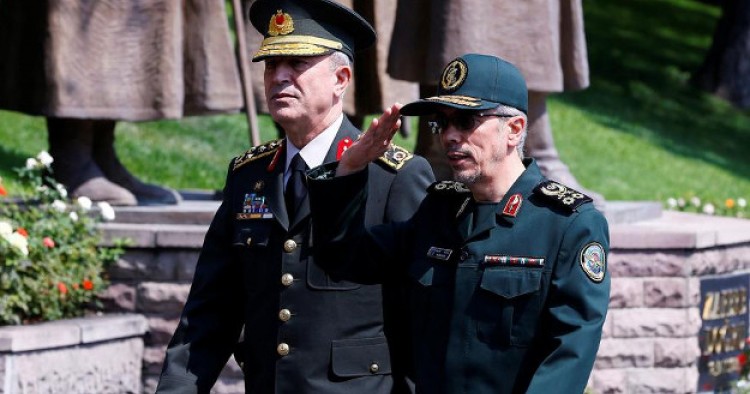The top Iranian and Turkish military officials discussed the Iraqi Kurdistan’s independence referendum plan and its implications in a telephone call earlier today, Iranian media reported. “The two sides stressed the significance of enhancing bilateral relations and cooperation and described the potential independence referendum in the Iraqi Kurdistan and its ramifications on regional security, peace and stability – including on Iran and Turkey – as detrimental and dangerous,” Iran’s Fars News Agency reported. Major General Mohammad Hossein Bagheri, the chief of staff of the Iranian Armed Forces, and his Turkish counterpart General Hulusi Akar also stressed that Iraq’s neighbors must coordinate their efforts to “oppose the plan to hold this referendum and prevent the implementation of separatist designs in the region.”
Furthermore, the two military leaders also called on the United Nations and other international organizations to help stop the persecution of Muslims in Myanmar. They discussed ways to send humanitarian assistance to Muslims fleeing Myanmar.
Comment: Further details of the conversation are not known yet, but one key topic of discussion between the Iranian and Turkish leaders was certainly the latest security and political developments in Syria. As Bagheri and Akar were talking on the phone, representatives from Iran, Turkey and Russia were attending the sixth round of talks in Astana, trying to finalize an agreement to form four de-escalation zones in Syria. The meetings, which include delegations from the Syrian government and opposition factions, will continue tomorrow. The previous round of talks in Astana failed to yield results as the parties reportedly did not agree on terms of a de-escalation zone for Syria’s Idlib Province. But as relations between Ankara and Tehran have recently improved significantly, it is expected that all sides will reach an agreement this time.
Iran and Turkey have pursued divergent policies in Iraq and continue to support opposing sides in the Syrian civil war. In recent months, however, the two non-Arab Middle Eastern powers have taken steps to narrow their differences and accommodate each other’s interests and concerns to a certain extent. Last month, a high-level Iranian delegation led by Bagheri visited Ankara and met with Turkish President Recep Tayyip Erdogan, Defense Minister Nurettin Canikli and Akar to discuss ways of boosting bilateral defense ties, coordinating joint counterterrorism efforts and reconciling the two countries’ policy differences in Syria and Iraq. And since then, Turkish leaders have toned down their criticism of the Syrian and Iranian governments; and likewise, Tehran has adopted a more conciliatory approach toward Ankara.
In Syria, the main concern for Ankara appears to be the growing strength and presence of the U.S.-backed Kurdish People’s Protection Units (Y.P.G.) close to its border with Syria. Having failed to convince Washington to halt its support for the Kurdish forces in Syria, Ankara now thinks Russia and Iran could be more helpful. The Turkish government considers Y.P.G. a terrorist organization and an offshoot of the Kurdistan Workers Party (P.K.K.), which has fought a violent insurgency against Turkey over the past three decades. In addition to the Kurdish issue, the Turkish government is concerned about the concentration of terrorist groups in Syria’s Idlib Governorate and its security and humanitarian implications for Turkey.
Iran and Turkey have also been trying to find a common ground in Iraq. Both Turkey and Iran oppose the Iraqi Kurdistan’s plan for independence because of the concern that it could energize calls for separatism among their own restive Kurdish populations.
According to Iranian media, Erdogan and Akar are expected to visit Tehran in the near future.
The Middle East Institute (MEI) is an independent, non-partisan, non-for-profit, educational organization. It does not engage in advocacy and its scholars’ opinions are their own. MEI welcomes financial donations, but retains sole editorial control over its work and its publications reflect only the authors’ views. For a listing of MEI donors, please click here.













